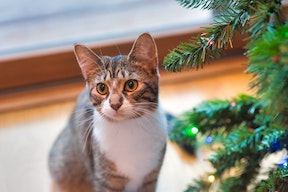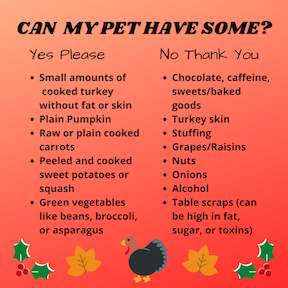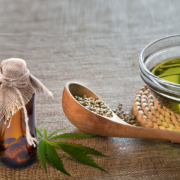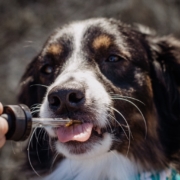This year our holiday season is going to be a bit different. There will certainly be adjustments to stay safe and healthy. Maybe your family will eat Thanksgiving dinner over Zoom. Maybe you’ll be mailing a lot of Christmas or Hanukkah gifts. We have one constant though, and that’s our pets! Our four legged family will be there with us like they have been all year. However, holidays can be a stressful or potentially dangerous time for our pets. Here are some tips to keep your pet safe and stress free during the holiday season!
 Holiday Stress
Holiday Stress
Typically, the holiday season is a time of change in your pet’s environment. There are more people visiting their home and changes to their owner’s routine or work schedule. Pet owners put up decorations in the home and move furniture around. There may even be fireworks or boisterous gatherings that can be too noisy for pets. With a little planning, you can reduce the stress your pet may feel at these changes.
- Create a safe space for your dog or cat to retreat to when events become too loud or chaotic for them. Put it in a quiet place in your home with their favorite bedding and toys and even a fan or white noise maker to help mask any stressful sounds. Make sure it is a space that they are willingly go to, do not force them to retreat there (especially for pets with separation anxiety, they might rather be with you). You might even consider leaving a longer lasting special treat there, like a stuffed kong or bone, to encourage their enjoyment of this safe space. For cats, if they are being closed into a room, make sure they have access to their litter box and food/water.
- If your pet prefers to be near you and the action, keep a close eye on their behavior to ensure they are not becoming overwhelmed or anxious. Be sure to let your guests know how to interact appropriately with your pets. Ask them to not follow or chase your pet if he or she walks away from them. Be sure that if your pet retreats to their safe space guests do not bother them. Consider requesting that guest not feed your pet any treats by hand, especially human food! If they’d like to give your pet a treat, they can offer pet friendly treats by placing them on the floor nearby to reduce the risk of a stressed pet lashing out.
- If your guests are bringing pets of their own, consider asking them to come before the others so that you can introduce both pets in a less chaotic environment where you can closely monitor their reactions to ensure everyone’s safety and enjoyment.
- Watch the doors as you greet guests as they enter your home. Even a pet who is comfortable around people may make a break for an open door to get away from any stressors. Be sure your pet is wearing their collar/ID tags and has up to date microchip information just in case.
- Keep countertops and trash cans secure. Even the most well behaved pet can be tempted by all that delicious food. Be sure that you are watching your countertops and trash cans (or have secured them when you leave the room) so that your pets cannot get into something that could harm them.
- Consider forgoing the pet costume. Many pets do not appreciate wearing clothes. If you attempt to put a costume on your pet and they react anxiously or negatively, quickly remove it to decrease the amount of stress they are experiencing.
- Use pheromone diffusers or collars to help your pets cope with any stress during the holidays. Adaptil and Feliway are well known and effective brands of pheromone based products that could help your pet.
Holiday Decorations
Festive decorations in and around our home are important to many of us. We love our Christmas trees, garlands, and candles galore. Decorations can pose a hazard for pets though, so make sure you have secured them all safely and do not bring any toxic decorations or plants into your home where your pet can reach them.
- Secure your Christmas tree. Consider tying your tree to the ceiling or nearby doorframe with fishing line to prevent it from tipping if your pets climb up or try to play with the lights and ornaments. The AVMA also recommends hanging lemon scented air fresheners in your tree to deter cats from climbing up (and your house will smell lemony fresh!).
- Ensure your tree’s water source is kept away from pets. Be careful if you put any additives in your tree’s water, but even tree sap can be harmful to pets if ingested. Some Christmas trees also have fertilizers that could be harmful to your pet. Try to prevent your dog or cat from drinking out of your tree stand.
- Keep your pets away from lights, tinsel and ornaments. PetMD suggests keeping lights, tinsel, and ornaments off the bottom third of your tree to reduce temptation. Those shiny ornaments, especially homemade ones out of natural materials or salt dough, are a great temptation for pets. Make sure any that could be broken or ingested are out of your pet’s reach. If eaten, they could cause a blockage or toxicity. Tinsel is another great temptation for pets, especially cats. Consuming them can cause intestinal blockages that may require surgery. Chewing on electrical cords can be harmful and may cause burns. Zoetis Petcare recommends spraying cords and even trees with bitter spray as a deterrent for pets.
- Do not place toxic plants within reach of pets. Several popular holiday plants are dangerous for pets. According to the ASPCA, Amaryllis, mistletoe, poinsettia, balsam, pine, cedar, lilies, and holly are all poisonous if ingested so be careful not to allow your pets near them or better yet, make sure you don’t have any in your home.
- Watch candles and potpourri around your pet. Open flames can be tempting to pets so make sure you are always supervising your pet if you have lit candles around. Both liquid and solid potpourris contain essential oils and ingredients that can damage your pet’s eyes, mouth, and skin if inhaled or eaten. Be especially careful with essential oils if you own a cat, they are extremely sensitive to most oils.
Don’t forget to unplug any decorations, blow out any open flame, and secure trash cans before you leave your home. Electrical cords can be a temptation for both dogs and cats.
Holiday Food
We all want to share our holiday meal with our pets. What harm is a little taste of turkey going to do? However, experts advise against feeding your pet human food for multiple reasons. Your food may have ingredients or additives that are toxic to your pet. While some people food is technically safe for pets, feeding your pet from the table can result in some pretty excessive begging (not to mention the drooling!) so it’s not a good habit to get into. If you’d like to be extra safe, you can feed your pet homemade pet treats or specifically formulated commercial treats with a holiday flair. However, there are a few human foods that your pet can share with you:

If you suspect that your pet ate something that could be harmful, contact your veterinarian or call the ASPCA Poison Control Hotline (a fee may apply). Be sure that your veterinarian’s contact information, as well as an after hours emergency clinic, is easily accessible.
ASPCA Poison Control Hotline: 1-888-426-4435
Bonus: DIY Treats for Your Pet
Your pet may not be allowed to eat much of the people food you’re enjoying, but they could have some special treats of their own. Check out this recipe for turkey and cranberry meatballs for your pup or these tasty treats for your cat.
Happy holidays to you and your family, two and four legged! Stay safe and stay well!


 CBD, or cannabidiol, is a compound extracted from the cannabis sativa, or hemp, plant. It is derived from the non-intoxicating portion of the plant (high in omega-3 and omega-6 essential fatty acids, omega-9, amino acids, proteins, and other healthy nutrients) independently of THC, as opposed to marijuana. Definitions of hempseed oil or CBD versus marijuana are dependent on the amount of THC, or tetrahydrocannabinol – a psychoactive compound, in the product. According to the
CBD, or cannabidiol, is a compound extracted from the cannabis sativa, or hemp, plant. It is derived from the non-intoxicating portion of the plant (high in omega-3 and omega-6 essential fatty acids, omega-9, amino acids, proteins, and other healthy nutrients) independently of THC, as opposed to marijuana. Definitions of hempseed oil or CBD versus marijuana are dependent on the amount of THC, or tetrahydrocannabinol – a psychoactive compound, in the product. According to the  Many pet owners have reported positive results when giving their pets CBD products. In theory, CBD can provide the
Many pet owners have reported positive results when giving their pets CBD products. In theory, CBD can provide the